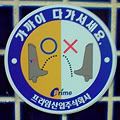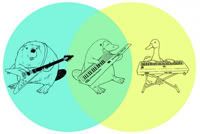| View previous topic :: View next topic |
| Author |
Message |
Troglodyte

Joined: 06 Dec 2009
|
 Posted: Wed Feb 10, 2010 5:19 am Post subject: Automated Conversion of Hangul to Greco-Roman Posted: Wed Feb 10, 2010 5:19 am Post subject: Automated Conversion of Hangul to Greco-Roman |
 |
|
Does anyone know of a program or website that can transcribe hangul chracters into their phonetic eqivalent in greco-roman letters?
I'm trying to learn spoken Korean and I find it a lot easier to sound out the words if i see them written in an alphabet that i already know. |
|
| Back to top |
|
 |
crisdean
Joined: 04 Feb 2010
Location: Seoul Special City
|
 Posted: Wed Feb 10, 2010 6:21 pm Post subject: Posted: Wed Feb 10, 2010 6:21 pm Post subject: |
 |
|
I don't know of any such program, but there's bound to be one somewhere on the net, though greco-roman isn't the right term since greek and latin use different alphabets.
However I would caution you that this might not be a good idea, as you may end up using it as a crutch, and the various romanisations of Korean aren't very good anyways, especially the vowels and dipthongs.
I would recommend just sitting down and learning the hangul jamo ("letters"), it's actually quite simple to learn the basics, though there are a great many pronunication exceptions, but from what I understand most of those exceptions exist merely to soften the sounds and if you say it the harsh way people will still likely understand. So don't worry so much about the exceptions just learn the basic sounds, it is said that Hangul (the written alphabet) can be learnt in a day, and I'd agree that.
And let's face it, if you're going to learn to speak Korean you'll need to learn to read and write eventually anyways, so you might as well do that first. |
|
| Back to top |
|
 |
kinerry
Joined: 01 Jun 2009
|
 Posted: Wed Feb 10, 2010 7:52 pm Post subject: Posted: Wed Feb 10, 2010 7:52 pm Post subject: |
 |
|
| crisdean wrote: |
I don't know of any such program, but there's bound to be one somewhere on the net, though greco-roman isn't the right term since greek and latin use different alphabets.
However I would caution you that this might not be a good idea, as you may end up using it as a crutch, and the various romanisations of Korean aren't very good anyways, especially the vowels and dipthongs.
I would recommend just sitting down and learning the hangul jamo ("letters"), it's actually quite simple to learn the basics, though there are a great many pronunication exceptions, but from what I understand most of those exceptions exist merely to soften the sounds and if you say it the harsh way people will still likely understand. So don't worry so much about the exceptions just learn the basic sounds, it is said that Hangul (the written alphabet) can be learnt in a day, and I'd agree that.
And let's face it, if you're going to learn to speak Korean you'll need to learn to read and write eventually anyways, so you might as well do that first. |
Ditto, to learn a language you need to think it the language you are learning, not your main language. |
|
| Back to top |
|
 |
redaxe
Joined: 01 Dec 2008
|
 Posted: Wed Feb 10, 2010 9:19 pm Post subject: Posted: Wed Feb 10, 2010 9:19 pm Post subject: |
 |
|
| Dude, just learn 한글, it takes like two days. Romanization only makes Korean more confusing because there are like four completely different systems and they are used interchangeably. |
|
| Back to top |
|
 |
crossmr

Joined: 22 Nov 2008
Location: Hwayangdong, Seoul
|
 Posted: Wed Feb 10, 2010 9:37 pm Post subject: Posted: Wed Feb 10, 2010 9:37 pm Post subject: |
 |
|
and any readers interpretation of what romanized korean should sound like is highly dependent on where they come from as letter pairings might be pronounced different depending on their first language.
romanization is useful for tourists and international media.. that is about it. |
|
| Back to top |
|
 |
orosee

Joined: 07 Mar 2008
Location: Hannam-dong, Seoul
|
 Posted: Wed Feb 10, 2010 10:00 pm Post subject: Posted: Wed Feb 10, 2010 10:00 pm Post subject: |
 |
|
Agree that it is best just to learn Hangeul, you'll get a lot of benefits from that.
Not sure how reliable this is, but Google Translate gave me this from a Korean phrase I copied off our corporate website:
| Quote: |
| pyeonjileul seontaeghu daleun pyeonji ham-eulo idong-eulhasimyeon pyeonjiui wichiga byeongyeongdoebnida. |
or this
| Quote: |
귀하의 모든 기지를 우리에게 속해있다
gwihaui modeun gijileul uliege soghaeissda |
It seems reasonable though I can't confirm this. |
|
| Back to top |
|
 |
redaxe
Joined: 01 Dec 2008
|
 Posted: Wed Feb 10, 2010 10:26 pm Post subject: Posted: Wed Feb 10, 2010 10:26 pm Post subject: |
 |
|
| orosee wrote: |
Agree that it is best just to learn Hangeul, you'll get a lot of benefits from that.
Not sure how reliable this is, but Google Translate gave me this from a Korean phrase I copied off our corporate website:
| Quote: |
| pyeonjileul seontaeghu daleun pyeonji ham-eulo idong-eulhasimyeon pyeonjiui wichiga byeongyeongdoebnida. |
or this
| Quote: |
귀하의 모든 기지를 우리에게 속해있다
gwihaui modeun gijileul uliege soghaeissda |
It seems reasonable though I can't confirm this. |
That's pretty close, but there are some pronunciation shifts that aren't represented in the romanization.
For example, ㄱ sounds like ㅋ if it comes before ㅎ and ㅆ sounds like "t" if it comes before another consonant, so "soghaeissda" should be pronounced "sokhaeitta"
This is yet another reason why it's better to ditch the romanization and just learn the hangeul and their associated pronunciation rules. |
|
| Back to top |
|
 |
orosee

Joined: 07 Mar 2008
Location: Hannam-dong, Seoul
|
 Posted: Wed Feb 10, 2010 10:36 pm Post subject: Posted: Wed Feb 10, 2010 10:36 pm Post subject: |
 |
|
Well, good to know that Google is not perfect yet!
My life changed from impossible to merely challenging once I knew how to read Korean characters (even without understanding the meaning of the words).
No point in learning the Latin script for 'pharmacy' when one can't recognise it in Hangeul 
Not to mention that dictionaries will be pretty useless without the skill. |
|
| Back to top |
|
 |
cheolsu
Joined: 16 Jan 2009
|
 Posted: Wed Feb 10, 2010 10:53 pm Post subject: Posted: Wed Feb 10, 2010 10:53 pm Post subject: |
 |
|
Reading romanized Korean is a nightmare. Reading anything more than certain words is a nightmare. It's much, much better to learn to read Korean. You will go much farther.
Yaereuldeulmyeon, ee munjang ilgeosaeyo:
Hangookmal yeongmun-euro sseomyeon neomu eoryeoweoyo. Geuraeseo, jom hangul bbali baeweosaeyo.
As you try to write sentences, you get lost in the alphabet soup of vowels and combinations that are impossible to decipher for an English speaker, like eoryeoweoyo (어려워요), which I would probably read ee-oh-rye-ee-oh-we-oh-yo instead of aw-ryaw-waw-yo. |
|
| Back to top |
|
 |
orosee

Joined: 07 Mar 2008
Location: Hannam-dong, Seoul
|
 Posted: Thu Feb 11, 2010 12:09 am Post subject: Posted: Thu Feb 11, 2010 12:09 am Post subject: |
 |
|
| cheolsu wrote: |
| eoryeoweoyo (어려워요), ... aw-ryaw-waw-yo. |
If Tarzan had been Korean...  |
|
| Back to top |
|
 |
Gaber

Joined: 23 Apr 2006
|
 Posted: Thu Feb 11, 2010 4:12 am Post subject: Posted: Thu Feb 11, 2010 4:12 am Post subject: |
 |
|
So, I take it your looking to wrestle the language under control...
sry... |
|
| Back to top |
|
 |
Troglodyte

Joined: 06 Dec 2009
|
 Posted: Thu Feb 11, 2010 7:35 am Post subject: Posted: Thu Feb 11, 2010 7:35 am Post subject: |
 |
|
| crisdean wrote: |
greco-roman isn't the right term since greek and latin use different alphabets.
|
The alphabet that we use in English (and most of Western Europe) is a combination of both. "Greco-roman alphabet" is a commonly used term.
I will probably learn to read some Korea at some point but for now I am mainly interested in some basic speaking skills. In particular, phrases. I've learned plenty of languages before and I've found that for ME this method is the most productive. If someone else has found that a different method works for them, congrats on that.
In case anyone else is looking for something like this, there is a transcription tool on this page.
http://www.sori.org/hangul/conv2kr.cgi |
|
| Back to top |
|
 |
|

